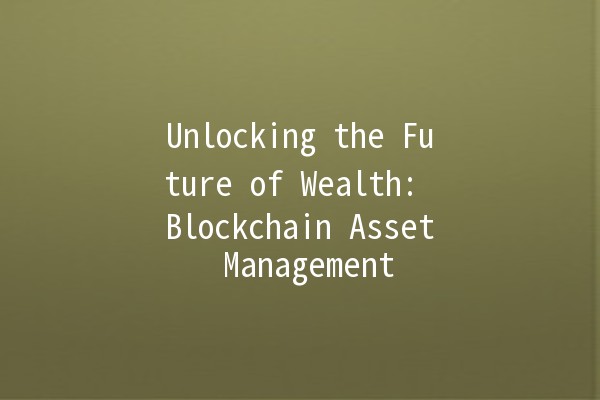
The financial landscape has evolved tremendously over the past few decades, with technology at the forefront of this transformation. One of the most significant innovations is blockchain technology, which has revolutionized asset management. This article dives deep into blockchain asset management, exploring practical tips and techniques for leveraging this modern approach to enhance productivity and security in your financial dealings.
Understanding Blockchain Asset Management
Blockchain asset management refers to the use of blockchain technology to record, track, and manage digital assets. These assets can include cryptocurrencies, NFTs (NonFungible Tokens), and tokenized traditional assets like real estate and stocks. The decentralized nature of blockchain ensures transparency, security, and efficiency, making it an attractive option for investors and asset managers alike.
Key Benefits of Blockchain Asset Management

Main Components of Blockchain Asset Management
Digital Wallets: Used to store digital assets securely.
Smart Contracts: Selfexecuting contracts with the terms of the agreement directly written into code.
Tokenization: The process of converting physical assets into digital tokens that can be traded on blockchain platforms.
Five Productivity Tips for Effective Blockchain Asset Management
Description: Digital wallets are essential for storing and managing your cryptocurrencies and tokens securely. They come in various forms, including hardware wallets, software wallets, and mobile wallets.
Example: If you're managing a diverse cryptocurrency portfolio, consider using a hardware wallet like Ledger or Trezor for enhanced security. Regularly update your wallet software to protect against vulnerabilities.
Description: Smart contracts enable automated execution of agreements when predetermined conditions are met, ensuring that processes run smoothly without the need for intermediaries.
Example: To streamline rental property management, a landlord could use a smart contract to automatically release rental payments when the tenant's cryptocurrency wallet confirms funds are available, reducing delays and mistakes.
Description: The regulatory landscape for blockchain and cryptocurrencies is constantly evolving. Staying informed will help you adjust your practices accordingly and avoid potential legal issues.
Example: Subscribe to newsletters from reputable sources such as CoinDesk or CryptoSlate to get realtime updates on regulatory changes affecting blockchain asset management in your region.
Description: Just as with traditional investments, diversification in blockchain asset management minimizes risk and maximizes potential returns.
Example: Invest across various asset classes such as cryptocurrencies, tokenized real estate, and NFTs. This strategy not only spreads risk but also capitalizes on different market trends.
Description: Given the increasing number of cyber threats, robust security measures are crucial for protecting your digital assets.
Example: Utilize twofactor authentication (2FA) for your wallets and accounts. Regularly back up your wallet and use strong, unique passwords to enhance security. Additionally, consider using a VPN when accessing your wallets online.
Addressing Common Concerns in Blockchain Asset Management
Blockchain enhances security through its decentralized and distributed nature. Unlike traditional systems, where data is stored in centralized databases vulnerable to hacking, blockchain records are stored across multiple nodes. Each transaction is encrypted and linked to the previous one, making tampering virtually impossible. For example, Bitcoin's underlying technology protects it from doublespending and fraud.
When choosing a digital wallet, consider factors such as security features (like 2FA and encryption), user experience, compatibility with different cryptocurrencies, and whether you prefer cold (offline) or hot (online) storage. Hardware wallets provide more security for longterm storage, while hot wallets are suitable for frequent transactions.
While blockchain asset management offers numerous benefits, it may not be suitable for all investors. Those unfamiliar with digital assets or who prefer traditional investment methods may find the learning curve steep. However, with the right education and resources, individuals can grasp the fundamentals and reap the benefits of blockchain investment.
To protect your investments from market volatility, employ strategies like dollarcost averaging (investing a fixed amount regularly), diversifying your portfolio, and setting stoploss orders to limit potential losses. Additionally, staying informed about market trends and leveraging analysis tools can help make more informed decisions.
Tokenization involves converting physical assets into digital tokens that can be easily traded on blockchain platforms. This process increases liquidity, as fractional ownership allows investors to access highvalue assets they might not have been able to afford outright, such as artwork or real estate. By lowering the barriers to entry, tokenization opens new investment opportunities for a larger pool of investors.
Investing in and trading digital assets can have significant tax implications, including capital gains taxes. It's crucial to keep accurate records of your transactions for tax reporting. Consult with a tax professional familiar with cryptocurrency regulations in your country to ensure compliance and efficient tax planning.
Engaging with the Future of Blockchain Asset Management
Adopting blockchain asset management techniques can revolutionize the way you handle your investments. By utilizing digital wallets, implementing smart contracts, staying informed on regulations, diversifying assets, and enhancing security, you can significantly improve your productivity and confidence in managing your financial future.
As the blockchain ecosystem continues to evolve and integrate into more sectors, the potential for asset management will only grow. Embrace these changes and stay ahead of the curve by exploring innovative financial technologies and methods. Your journey into blockchain asset management is not just a financial decision; it's a step towards a more decentralized, transparent, and efficient future in wealth management.
This comprehensive exploration of blockchain asset management highlights practical tips designed to enhance your approach to managing digital and tokenized assets. As you continue your journey, consider seeking expert advice and leveraging community knowledge to make the most of this transformative technology.

